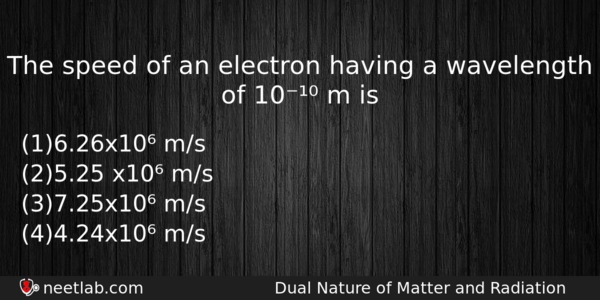| ⇦ | 
| ⇨ |
The speed of an electron having a wavelength of 10⁻¹⁰ m is
Options
(a) 6.26×10⁶ m/s
(b) 5.25 x10⁶ m/s
(c) 7.25×10⁶ m/s
(d) 4.24×10⁶ m/s
Correct Answer:
7.25×10⁶ m/s
Explanation:
λ = h / momentum = h / mv
v = h / mλ = 6.6 × 10⁻³⁴ / (9 × 10⁻³¹) × 10⁻¹°
v = 7.25 × 10⁶ ms⁻¹
Related Questions: - When a light beam of frequency v is incident on a metal surface,
- A rod of weight W is supported by two parallel knife edges A and B is in equilibrium
- Two bubbles A and B (A>B) are joined through a narrow tube. Then
- Large transformers, when used for some time, become hot and are cooled by circulating
- A force F=ai+3j+6k is acting at a point r=2i-6j-12k. The value of α for
Topics: Dual Nature of Matter and Radiation
(150)
Subject: Physics
(2479)
Important MCQs Based on Medical Entrance Examinations To Improve Your NEET Score
- When a light beam of frequency v is incident on a metal surface,
- A rod of weight W is supported by two parallel knife edges A and B is in equilibrium
- Two bubbles A and B (A>B) are joined through a narrow tube. Then
- Large transformers, when used for some time, become hot and are cooled by circulating
- A force F=ai+3j+6k is acting at a point r=2i-6j-12k. The value of α for
Topics: Dual Nature of Matter and Radiation (150)
Subject: Physics (2479)
Important MCQs Based on Medical Entrance Examinations To Improve Your NEET Score
18000+ students are using NEETLab to improve their score. What about you?
Solve Previous Year MCQs, Mock Tests, Topicwise Practice Tests, Identify Weak Topics, Formula Flash cards and much more is available in NEETLab Android App to improve your NEET score.
Share this page with your friends

P=h/lamba…..1equ
P= momentum
H=Planck’s constant
Lamba= wavelength
And
P=MV…..2 equ
M= mass
V= speed
Put 2 in 1
MV=h/lamba
9.1×10^-31*v=6.6×10^-34/10^-10
By solving u get the value of v
V=0.725*10^7=7.25*10^6